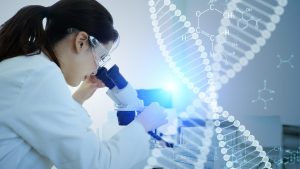
Cell & Gene Therapy Research in Philadelphia has become a very prominent medical process over the past few years, Philadelphia and the surrounding area have long been a center of medicine and life science discoveries but Cell & Gene Therapy have recently been acknowledged by many as a large part of the medical process in Philadelphia.
Long ago the Pennsylvania Hospital, was the nation’s first hospital, and it was founded in 1751 by Benjamin Franklin and Dr. Thomas Bond. Located at 8th and Spruce, it has been in operation for over 270 years. Throughout its history, Penn has been at the forefront of innovative high-quality patient care and helped usher in what became the beginning of the modern medicine era.
“The Gross Clinic”, a famous painting by Thomas Eakins in 1875, depicts Dr. Samuel Gross, a surgeon at the Jefferson Medical College performing surgery on a patient in a round theater in Philadelphia. This world famous painting has an important place documenting the history of medicine, because it depicts the emergence of surgery as a healing profession. Prior to this form of surgery, the typical practice involved amputation, which caused severe medical complications, sometimes killing the patient. Further, The Gross Clinic shows what a surgical theater looked like in the nineteenth century. Both Penn and Jefferson believed strongly the need to innovate, practice new techniques and train new doctors in those practices. This ethos persists today and embodies the collaborative nature of the Philadelphia medical and life science ecosystem that thrives today, with Pennsylvania Medicine (“Penn”), Jefferson University and Hospital (“Jeff”) and Children’s Hospital of Philadelphia (“CHOP”) leading the way.
Further, GSK, Merck, Astra Zeneca and other pharmaceutical companies have long had a significant presence in the Philadelphia area. Each conducted their own independent and significant research in various medical areas. As a result of this major life science ecosystem, the Philadelphia area has always had a deep bench of talent working in a wide variety of medical specialties and pharmacology.
Cell & Gene Therapy Research In Philadelphia Today
Fast forward to the 2000’s where Cell & Gene Therapy Research in Philadelphia has become one of the most important markets for advances. Much can be attributed to Dr. Carl June, who is widely considered one of the early pioneers in the cell and gene therapy space. Dr. June is the Richard W. Vague Professor in Immunotherapy in the Department of Pathology and Laboratory Medicine at Penn. He is currently the Director of the Center for Cellular Immunotherapies and of Translational Research in the Abramson Cancer Center of the University of Pennsylvania, and is an investigator of the Abramson Family Cancer Research Institute.
Dr. June maintains a research laboratory that studies various mechanisms of lymphocyte activation that relate to immune tolerance and adoptive immunotherapy for cancer and chronic infection. In 2011, his research team published findings, which represented the first successful and sustained demonstration of the use of gene transfer therapy to treat cancer. Clinical trials utilizing this approach, in which patients are treated with genetically engineered versions of their own T-cells, are now underway for adults with chronic lymphocytic leukemia and adults and children with acute lymphoblastic leukemia. Early results in that group show that 90 percent of patients respond to the therapy, and more recently, trials of this approach have begun for patients with other blood cancers and solid tumors including pancreatic cancer, mesothelioma and the brain cancer glioblastoma. In 2014, it became the first personalized cellular therapy for the treatment of cancer therapy to receive the U.S. Food and Drug Administration’s prestigious Breakthrough Therapy designation. He maintains a research laboratory that studies various mechanisms of lymphocyte activation that relate to immune tolerance and adoptive immunotherapy for cancer and chronic.
Current Doctors Performing Cell & Gene Therapy Research In Philadelphia
Another legendary pioneer in the Cell & Gene Therapy sector is Dr. Jim Wilson. Dr. Wilson is an innovator and pioneer in the field of gene therapy. In a career spanning four decades, he has identified, isolate and developed virus-based vectors for in vivo gene therapy. Dr. Wilson’s lab is responsible for discovering a new family of endogenous adeno-associated viruses (AAV) that have become best-in-class for in vivo gene therapy vectors. His research efforts and novel technology have contributed to successful clinical programs of in vivo gene therapy for rare monogenic diseases developed by other companies, including Glybera for familial lipoprotein lipase deficiency (AAV1), Luxturna for RPE65-mediated retinal dystrophy (AAV2), and Zolgensma for spinal muscular atrophy (AAV9). More recently, Dr. Wilson’s lab demonstrated for the first time therapeutic in vivo genome editing in a large animal model, thus extending the therapeutic potential of the AAV platform.
Currently, Dr. Wilson’s laboratory focuses on the development of gene transfer vectors and their application in the treatment of inherited and acquired diseases. Characterization of these novel virol isolates has yielded important insights into basic virology. More importantly, recombinant versions of these viruses have proven to be useful as improved gene transfer vehicles to a variety of targets such as the liver, cardiac and skeletal muscle, and the brain.
Largely due to Dr. June and Dr. Wilson, Cell & Gene Therapy Research in Philadelphia has emerged as a dynamic center in the medical field of Pennsylvania. Many companies have either sprung directly from their research, such as Spark Therapeutics, or have relocated here due to the nature of the research and collaborative ecosystem that has developed as a result.
Driven by a highly-educated workforce and an influx of funding flowing to its world-renowned academic research institutions, hospitals, biotech companies and innovative startups, Philadelphia has quickly established itself as a leader in the cell, gene, and mRNA therapy space, which is driving increasing demand for high quality lab space.
Over the past ten years, companies focused on Cell and Gene therapies have been flocking to Philadelphia. Amicus Therapeutics relocated their entire team to start doing Cell & Gene Therapy Research in Philadelphia. Calbaletta Bio, Century Therapeutics, and many others have either relocated to Philadelphia or opened research lab and offices here.
As a result of the demand for lab and life science space, Philadelphia is undergoing a life sciences building boom with $4 billion in projects in various stages of planning and development, setting the stage to grow In University City, these projects include Spark Therapeutics’ proposed $575 million, 500,000-square-foot gene therapy manufacturing facility and Wexford Science & Technology and Ventas Inc.’s One uCity Square, a 400,000-square-foot building. In New Castle, WuXi STA is moving forward with an initial $510 million investment in a 600,000-square-foot complex and MRA Group plans a $500 million conversion of 780,000 square feet at Chestnut Run.
In the Philadelphia Navy Yard, the most successful BRAC transformation in the country, life science companies have located their HQ or major operations. GSK built their North American HQ at the Navy Yard. Adaptimmune, WuXi Advanced Therapeutics and Iovance Biotherapeutics all have major operations in the Philadelphia Navy Yard. Ensemble Mosaic, the master developer for new buildings in the Navy Yard, are in the final stages of construction of a state of the art 137,000 sf spec lab building at 1201 Normandy Drive. In Philadelphia’s suburbs, projects are underway in Horsham, Lower Gwynedd, King of Prussia and Exton, boosting the region’s economy with thousands of new jobs and life-saving discoveries.


